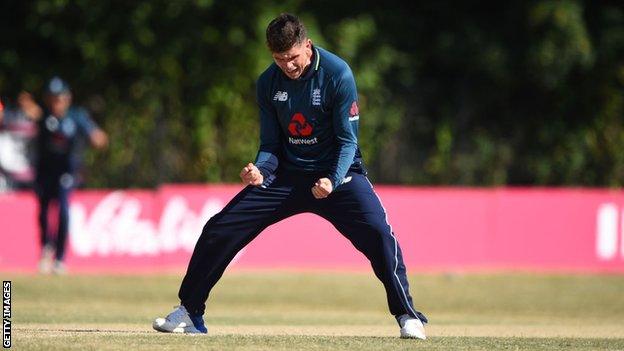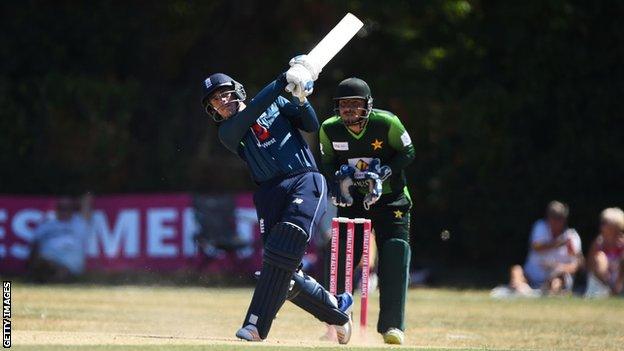Liam O'Brien: Cricketer had to 'drop his ego' to play for England physical disability team
- Published

Liam O'Brien finished last year's one-day series against Pakistan as England's top wicket-taker
If you follow any sport, chances are you have bought a replica kit at some point in your life.
Liam O'Brien is no different. Except buying an England cricket shirt on a trip to Lord's "with the missus" led to him pulling on the real thing.
All-rounder O'Brien plays for the England physical disability cricket team. But until just a couple of years ago, he "didn't believe" he was disabled.
Born with bilateral tilapes, more commonly known as clubfoot, his parents never let him use the condition "as an excuse" despite the physical pain it caused him.
"My parents raised me fully able, they didn't consider me disabled and never treated me any differently," the 20-year-old tells BBC Sport.
"I didn't believe I was disabled. I just thought I had clubfoot."
So much so, O'Brien - on the books of Sussex - was focused on becoming a professional cricketer.
But when his score in a routine jump test in training came up inferior to that of his team-mates, he knew something was different. Until that point, he did not know of the "limitations" that accompanied his disability.
"I didn't know my ankles weren't as flexible as other people's. I didn't know I couldn't jump as high as other people. I didn't know I couldn't run as fast. I just knew it hurt," he says.
"They were joking and taking the mickey. I didn't know why my score was so low as I was one of the fittest in the group, and they said it must be my ankles.
"It was said so casually, as though I was meant to know, but I didn't. So when my strength and conditioning coach made it obvious to me, I realised."
In 2018, O'Brien was voted the Lord's Taverners Disability Cricketer of the Year after an impressive debut one-day series against Pakistan in which he finished as England's top wicket-taker and hit a 40-ball 75.
Two years earlier, he was still trying to forge a career in country cricket, his ambition to play for England's "mainstream" team, as he puts it.
But a trip to the Lord's club shop with his girlfriend changed all that.
"We went to the shop and I liked one of the England training shirts," he says. "I bought one and I wore it to my academy training the next day, and they all joked that I was playing for England physical disability now.
"I didn't even know there was a PD team."

O'Brien and England will play in the inaugural Physical Disability World Cricket Series later this summer
O'Brien did not think he would qualify for the England PD team as he "just had club foot", yet he readily admits he did not think disability cricket would be a "good enough level" for him.
But a chat and a training session with the team's head coach Ian Salisbury proved all the convincing he needed.
"Ian was telling me how much of an honour it is to play for England, no matter what format," says O'Brien, whose cousin is QPR defender Grant Hall.
"As soon as I started talking to him, I forgot about every other county that I was trying to trial with or trying to make it pro.
"I had to drop my ego but, once I got rid of that, I get so much pride from playing for England."
The rest, as they say, is history. Later this summer, he will don an England shirt once again for the inaugural Physical Disability World Cricket Series, to be held in Worcestershire from 3-13 August.
It is another chance for him to impress on the pitch, but it is off the pitch where he is determined to use his position for the greater good.
"It was quite well written that I had a good summer last year. I did all right - I averaged well, I bowled well - but it was always just written about and there were no videos," he says.
"If I'm looking at it from a non-disability viewpoint, I would read that and think 'that's good for a disability level'. But if you actually see it, you see me hit a six over the club house. That's good, regardless of my disability.
"There's a thought that disabled sportspeople aren't as good because they are limited, but if you see us… seeing is believing.
"I massively want to help to get rid of that taboo. I don't consider myself disabled and I am confident there are hundreds, if not thousands, of kids just like me who have similar limitations but who would not even think about disability sport. They see it as a second option, maybe a weaker option.
"I want to be that role model, that voice that tells them to give it a go."